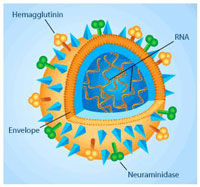Rising Burden of Diseases Drives the Pharmaceutical Industry in East Africa, Says Frost & Sullivan
infectious diseases are rampant in sub-Saharan Africa. Urbanisation and westernised lifestyles have further increased the prevalence of non-communicable diseases such as cancer. The strong correlation between infectious diseases and cancer has additionally fuelled the incidence rates of various cancers, driving the pharmaceutical industry in key east African countries.
"Although the management and prevention of infectious diseases has been the priority in sub-Saharan Africa, there is scant attention towards rising lifestyle diseases," says Frost & Sullivan programme manager Lizelle Wentzel. "For example,Uganda has one cancer institute, three oncologists and limited funding, but is attempting to make a difference through research collaborations, funding programmes, and training of staff to control the spread of cancer in the country."
New analysis from Frost & Sullivan, The Pharmaceutical Industry in Key East African Countries, finds that the market earned revenues of US$1.2 millionin 2009 and estimates this to reach US$2.8 million in 2016. The products covered in this study span the cardiovascular, respiratory, central nervous system, anti-infectives, oncology and diabetes sectors.
"Realising the growing burden of cancer has sparked increasing amounts of funding by private organisations and donors," says Wentzel. "East Africa has some of the highest rates of cancer in children and adults worldwide, with Uganda ranking first in the region."
Compounded by the spread of human immunodeficiency virus (HIV), cancer rates have risen to more than 20,000 fold in many African regions. Infectious diseases cause six of the ten most common cancers in Uganda. Kaposi sarcoma (KS) is the most widespread, with 975 new adult cases and 42 new child cases per annum. Nearly one in two Ugandans is infected with the human herpesvirus-8 (HHV-8).
However, access to inexpensive chemotherapy is limited, with most patients either not receiving any treatment or only a single course of drugs. Therefore, the survival rate of cancer patients post diagnosis is dismal in Uganda. Most patients cannot afford transport costs and treatment. While treatment is supposed to be free at the Ugandan Cancer Institute (UCI), the cost of a course of the recommended medication isUS$450.00. The lack of government support in cancer treatment curbs the successful management of this disease.
"The UCI's bed capacity is far below the demand and the institute requires a budget that far exceeds that of the Mulago Teaching Hospital's total annual budget for operation, salaries, education and awareness campaigns, and most importantly procurement of drugs," explains Wentzel.
Greater awareness about cancer and access to treatment is essential in alleviating the disease burden in Sub-Saharan Africa.
"The Ugandan government should recognise cancer as a priority disease and focus a percentage of annual funding towards the management of this disease," concludes Wentzel. "Although donor funding will alleviate some of the strain, it is crucial for the country to have access to anti-cancer treatments."
Most read news
Topics
Organizations
Other news from the department business & finance

Get the life science industry in your inbox
By submitting this form you agree that LUMITOS AG will send you the newsletter(s) selected above by email. Your data will not be passed on to third parties. Your data will be stored and processed in accordance with our data protection regulations. LUMITOS may contact you by email for the purpose of advertising or market and opinion surveys. You can revoke your consent at any time without giving reasons to LUMITOS AG, Ernst-Augustin-Str. 2, 12489 Berlin, Germany or by e-mail at revoke@lumitos.com with effect for the future. In addition, each email contains a link to unsubscribe from the corresponding newsletter.























































